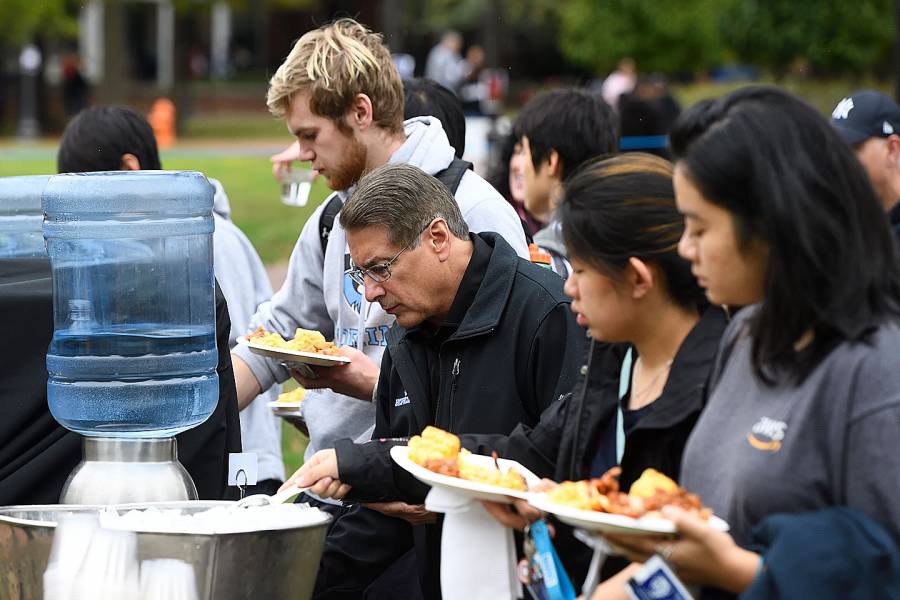Here to Help is a Hub at Work feature designed to help Johns Hopkins faculty and staff navigate the expansive world of the university. If you have questions in search of answers, email us at hubatwork@jhu.edu.
If you're planning an event—whether it's a casual birthday bash in the corner conference room or a formal luncheon with 150 guests—you'll no doubt put thought into where it will be, who will be invited, and what you'll feed your guests. But there's one more consideration that should be on every event organizer's mind: reducing waste. That's the goal of JHU's Zero-Waste Events program, which launched in 2013 with an eye toward promoting events on the Homewood campus that reduce to zero the amount of waste headed for incineration.
The program has grown each year since its inception, with about 55 percent of the past fiscal year's 458 events participating, says Brigid Gregory Trites, recycling coordinator for Homewood Recycling. And of the larger of those events, about 65 percent were zero-waste.
The benefits: Not only does the Zero-Waste Events program help reduce JHU's carbon footprint and reduce pollution associated with incinerator use, it also helps event planners cut costs because Homewood Recycling waives waste management fees for all zero-waste events.
Homewood Recycling offers a handy five-step guide to help with planning, but we also spoke recently with Trites to learn more about the program and how to pull off a zero-waste event. Her tips:
Understand what a zero-waste event is (and isn't!)
Although Trites and the recycling team would no doubt love every event to have no waste from start to finish, for now they're happy to focus the zero-waste efforts only on the products that guests interact with. That means that all cutlery, plates, cups, bowls, and other items used by guests must be compostable and recyclable.
"A lot of times people get confused and think it means the caterers can't use plastic trays or other items that aren't recyclable or compostable," Trite says. But when it comes to catering waste, "we don't require everything to be zero-waste," she explains (though she notes that tackling catering waste might well be a future goal).
Consider making almost any event zero-waste
"I get requests all the time from people saying, 'I'm only expecting 15 or 20 people, can I still do this?'" Trites says. The answer: yes! "The smallest bins we have (for recycling and composting) are for 20 people, but we will send out bins for almost any occasion."
In the past, zero-waste events have been anything from a student group hosting a casual gathering on the Beach, to a small office retirement party, to a 1,500-guest Whiting School of Engineering picnic. Though approved caterers are well versed in providing zero-waste products, smaller groups often choose to self-cater and purchase compostable disposables themselves. "If they do that, we give them information on how to purchase through Amazon or [food services contractor] Bon Appetit," Trites says.
Start planning by picking an approved green caterer
Zero-waste events go hand in hand with JHU's preferred green caterer program, which now includes 30 preferred caterers who have committed to providing JHU events with compostable disposables. "In recent years we've been increasing the number of preferred green caterers and reaching out to caterers to try to educate them about greener catering options, which makes for additional options for our staff on campus," says Trites, who advises starting the zero-waste event planning process by selecting an approved caterer. "That helps make the process go much smoother."
Trites recommends that when you choose a caterer, you should remind your contact that you're with JHU and would like compostables for your event, just in case you're speaking with a newer employee who isn't up to speed on the Zero-Waste Events program. An added benefit to choosing one of JHU's preferred caterers: Each offers vegetarian and vegan options that include a protein, and many are not only green but also are part of Johns Hopkins' HopkinsLocal initiative.
Purchase smart—and consider going the extra mile
Once you've selected your caterer, be sure to think green when making your product selections. That means purchasing drinks in bulk (think pitchers of beverages rather than individual bottles or cans, and airpots rather than boxed coffee). Bulk ordering applies to side orders and condiments such as ketchup or creamers, too. "Those are often the things that end up being overlooked and creating waste," Trites says. "So if you can think about any small way to avoid waste, you'll make an impact."
Want to take your efforts up a notch? "Think about your decorations," Trites says. "We discourage people from using any kind of disposables." Instead, consider decorations that can be used again for a future event, and be sure to steer clear of plastic throwaway tablecloths. "If possible, really think about how you can host an event without throwing anything into an incinerate bin."
Request event support
A critical element of a zero-waste event is having the bins required to receive recyclables and disposable compostables. Be sure to submit a request for bins as early as possible but no later than two days prior to your event. Homewood Recycling will waive your waste management fees if you host a zero-waste event, saving you between $33 and $150 per event. And keep in mind that the Zero-Waste Events program is currently offered only on the Homewood campus.
Put leftovers to good use
Be sure to consider taking part in JHU's Free Food Alert program, which fights food waste by notifying subscribers when there is leftover food at an event. Event organizers can take part by registering to be an FFA event planner, which simply requires completion of a quick training document and a terms and conditions form.
There are currently 80 registered FFA participants, who can post an alert for any event that has food remaining. Anyone with a JHU email address can sign up for the alerts, and with 2,550 current subscribers—about 12% of whom identify as food insecure—it's no surprise that when an alert goes out, "people usually start arriving within five minutes," Trites says. So far, the program has sent about 260 free food alerts, saving an estimated 5,500 pounds of food.
Have questions about how you can plan a zero-waste event? Contact Brigid Gregory Trites at brigidgtrites@jhu.edu. You'll also find more information on the Recycling Services page of the Facilities & Real Estate website.
Posted in News+Info, Happenings
Tagged here to help









